Unlocking Effective Data Leadership with Tris J. Burnes
Effective data leadership isn't just about handling numbers; it's about transforming data into a core business discipline that drives strategic decisions. Key takeaways include enhancing business literacy within data teams, reversing the service desk mentality, and ensuring alignment with organizational strategies.
Imagine walking into an organization where data is perceived as nothing more than a technical necessity. That's the reality many data leaders face today. Trist J. Burns, a key player in this field, shared his experiences and strategies during a recent livestream with Mirko Peters on the DataScience.show. From leading the data initiatives at Pizza Hut to advocating for the recognition of data as a crucial business discipline, this session was informative and engaging. Join us as we delve into the main points discussed, enriched with anecdotes and insights from the session!
Defining Data Leadership
In the world of data, it's essential to understand the dual roles that individuals may play. On one hand, we have the individual contributors. On the other, we have people managers. Both roles are fundamental within data leadership. But how do they differ, and why does it matter?
Understanding Dual Roles in Data Leadership
Imagine a ship sailing through the ocean. Individual contributors are like sailors who handle the ropes and manage the sails. They ensure the ship moves forward. Meanwhile, people managers are akin to the captain. They chart the course and guide the entire team towards a destination. Both have unique responsibilities, but they are equally important for reaching that destination.
Individual Contributors: They are the technical experts. They dive deep into the data, analyze trends, and generate insights. They act as thought leaders, driving innovation within organizations.
People Managers: They lead teams, set strategic visions, and manage stakeholder relationships. They ensure that everyone is aligned toward common goals and that communication flows seamlessly.
According to Trist J. Burns, differentiating between these roles is crucial for effective data leadership. Individual contributors may not manage people, but their influence is enormous. A well-respected technical expert can ignite passion and innovation in a team, even without a formal managerial title.
The Significance of Data Leadership
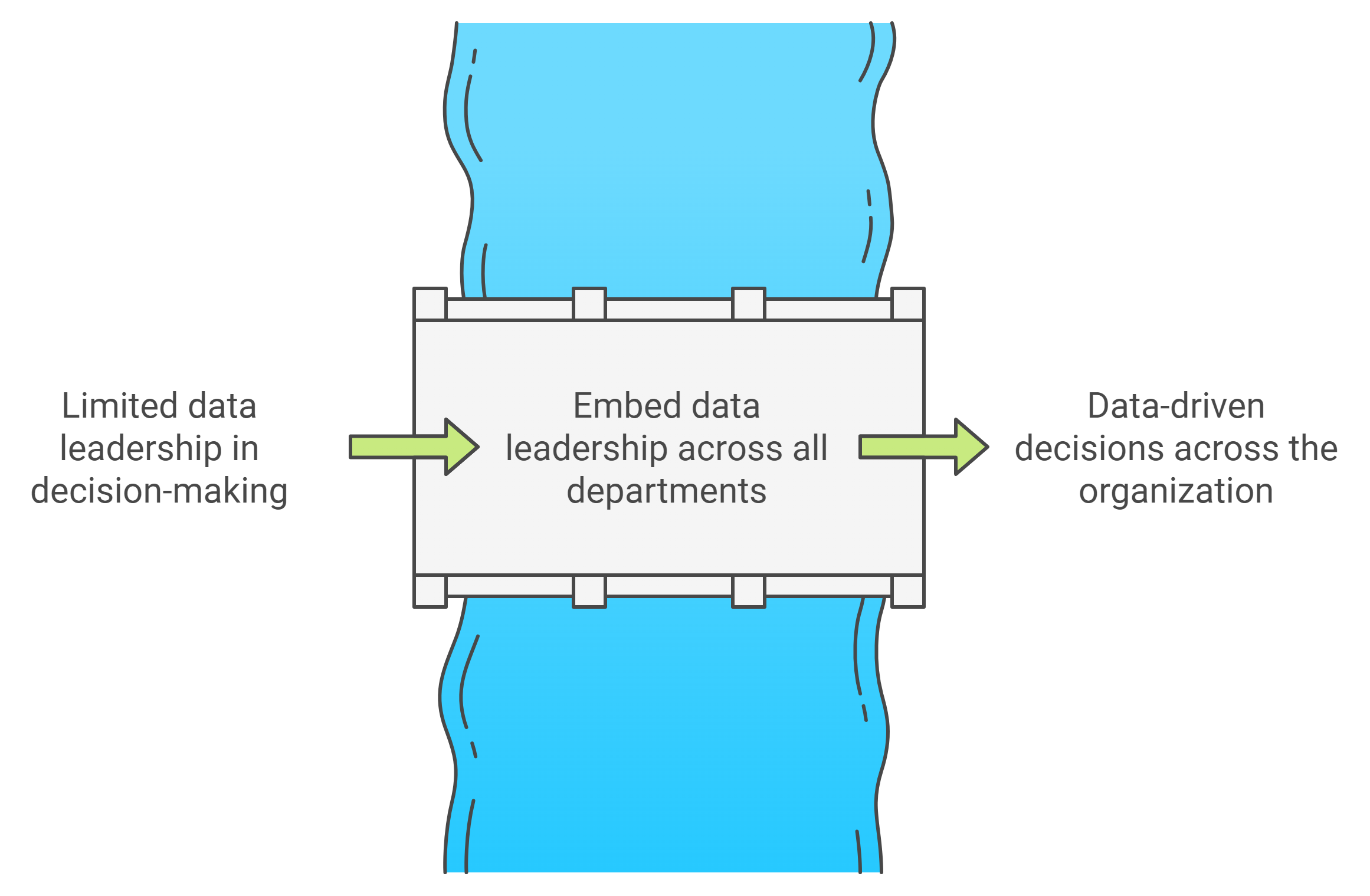
Now let's talk about the significance of data leadership. You might be wondering, what makes data leadership so vital in organizations today? The answer lies in its direct impact on an organization's strategy.
Imagine if a company relies solely on traditional methods of decision-making. Without effective data leadership, it might miss critical insights. In fact, a startling 73% of data leaders feel excluded from strategic decisions. This highlights a significant gap. How can organizations truly harness the power of data if their leaders feel left out of the conversation?
Furthermore, 60% of organizations still perceive data purely as a technical area. This limited view restricts the potential of data to inform decisions across different business areas, such as marketing and finance. It’s essential to embed data into the very fabric of the organization.
Insights from Trist’s Journey
Trist J. Burns, renowned for his transition from a technical expert to a coach in data leadership, offers valuable insights. His experiences illustrate the power of aligning data strategies with organizational goals. His core idea can be summarized in this quote:
"Data is a business discipline with technical components."
This encapsulates the blending of understanding and execution necessary for effective data leadership.
Throughout his journey, Trist has shown that effective data leadership should not solely focus on individuals' roles but also foster a culture that values data-driven decision-making. He emphasizes building strong relationships across departments. This way, data teams move from being mere service providers to becoming integral partners in shaping business directions. Are you fostering these kinds of relationships in your organization?
Changing the Perception of Data
To achieve this shift, organizations must start viewing data as a strategic resource. Data should connect directly with the core of business objectives. It is here where the phrase “data means strategy” comes into play. Remember, data isn't just about numbers; it's about insights that guide actions. We will touch on how to improve collaboration, enhance communication, and add value through data initiatives.
In a legacy company like Pizza Hut, where Trist served as the global head of data, understanding these aspects became challenging yet critical. Adapting data initiatives to traditional business models required innovative thinking and a clear vision.
In summary, effective data leadership relies on recognizing the dynamic roles within your team. By understanding the relationship between data strategy and organizational goals, you are well on your way to becoming a data-driven leader within your business. Always keep in mind, the world of data is evolving, and so must your strategies. Are you ready for that change?
Common Challenges Facing Data Leaders
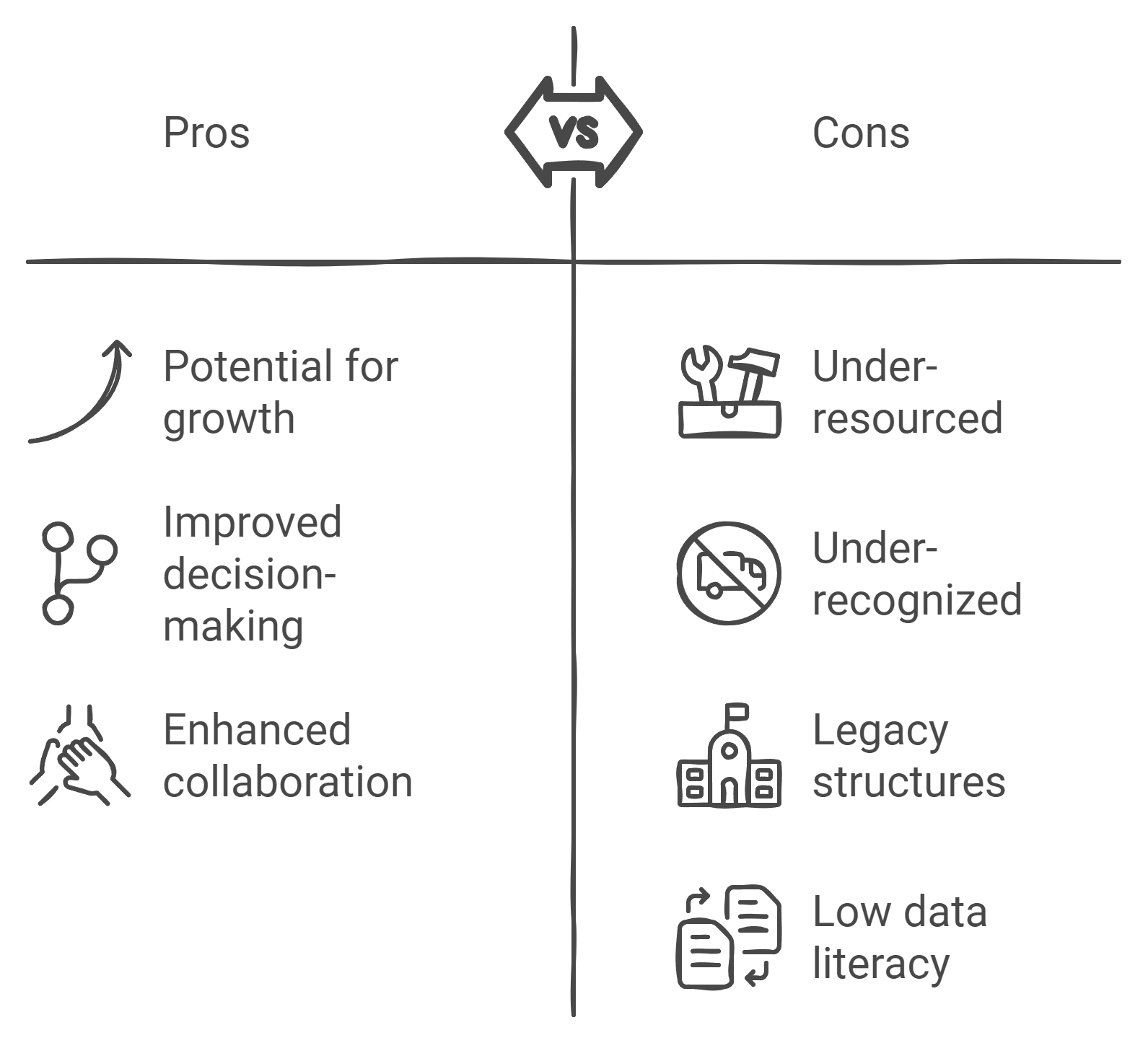
Data leadership comes with unique challenges. Do you ever feel like you're wading through molasses just to get the simplest data insights? If so, you're not alone. Many data leaders face these hurdles: being under-resourced and under-recognized within their organizations, navigating through legacy business structures resistant to data-driven decision-making, and struggling with low data literacy among stakeholders. Let's break these down.
1. Under-Resourced and Under-Recognized
Many data teams operate with limited resources. Have you found yourself wishing for more budget, staff, or tools? You're definitely not the only one. In fact, statistics reveal that 65% of data teams report lack of resources as a primary challenge. With fewer resources, it's harder to deliver impactful results, leading to a feeling of being undervalued.
Moreover, many data leaders feel like "secondary citizens" within their organizations. As
“Data leaders often feel like secondary citizens in their organizations.” - Trist J. Burns
This recognition deficit can further demotivate teams, pushing them to operate in the shadows while the rest of the business shines.
2. Navigating Legacy Business Structures
Next, let's discuss the challenges posed by legacy business structures. These organizations often resist change. Why? Because they stick to old practices. You might struggle to introduce innovative data-driven strategies. In environments where data is viewed merely as a support function—like a service desk rather than a partner—progress can stagnate.
Trist emphasizes the importance of reversing this dynamic; data teams should become proactive partners in business strategy. Do you proactively align your data initiatives with business goals? This alignment drives effective decision-making and can enhance your organization’s strategic position significantly.
3. Low Data Literacy
Finally, low data literacy among stakeholders can severely limit the impact of your data efforts. Employees might not understand basic data concepts. Instead of being facilitators, data leaders often become teachers. This is crucial, as data is increasingly recognized as a key part of the business landscape. Yet, the gap persists. How can you bridge this divide?
Implement workshops to improve data literacy.
Regularly communicate data insights in accessible language.
Encourage a culture of data-driven decision-making across the organization.
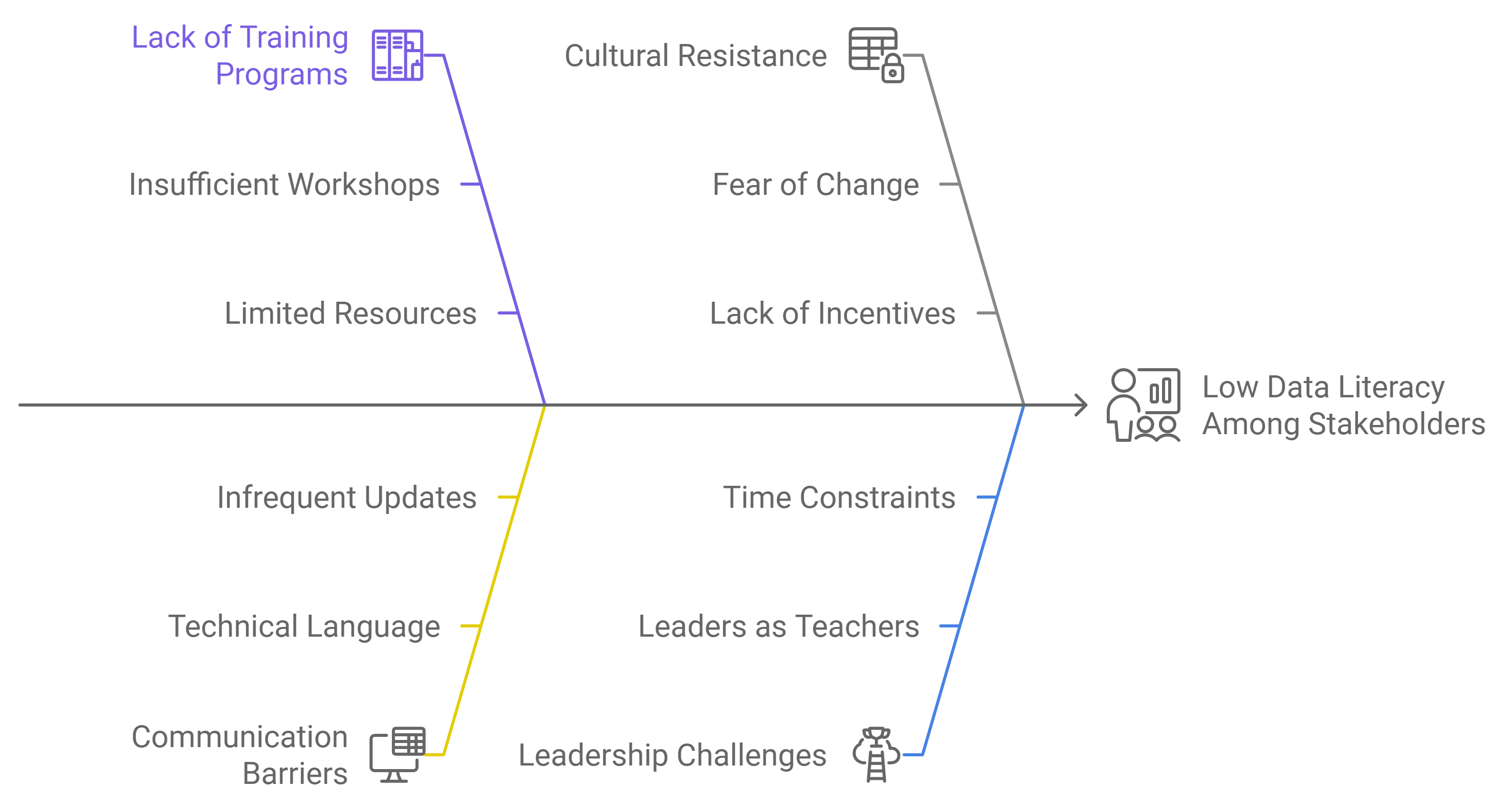
Making data understandable empowers stakeholders. It enhances engagement with data initiatives. With a team that thrives on data, the entire organization benefits. This is key to navigating the challenges you currently face.
Combining Roles: Player-Coach in Data Leadership
Many data leaders find themselves in player-coach roles. They manage the team but also handle the technical tasks. It’s a balancing act that can be exhausting. You may feel the pressure of meeting both leadership and technical expectations.
How can you tackle this? Focus on effective delegation. Train your team members to take on responsibilities that allow you more time to strategize and improve data management within your organization. This way, you can foster a stronger team dynamic while encouraging others to take ownership.
In Summary
It's essential to recognize these challenges as part of the data leadership journey. Understanding these barriers allows you to forge a path forward. While the road may be tough, strategies exist to help you navigate these common challenges and elevate the role of data in decision-making within your organization.
As Trist shared, success hinges on ensuring your data strategies clearly link to organizational objectives. The more aligned your data initiatives are, the greater impact they will have.
Strategies for Elevating Data's Role
In today's fast-paced business world, data is becoming the backbone of decision-making. Yet, many organizations struggle with utilizing data effectively. So, how can you elevate the role of data within your organization? Here are some effective strategies to consider.
1. Promote Data Literacy
First and foremost, it's essential to promote data literacy across both business teams and data teams. But what does this mean?
Data literacy is the ability to read, understand, create, and communicate data as information. It's not just for analysts; everyone in the organization should possess a basic understanding of data.
By improving data literacy, you empower your teams to make more informed decisions. When you understand data, you can interpret it meaningfully.
Organizations that have implemented data literacy training report a staggering 40% increase in engagement. That’s a huge return on investment!
2. Shift to a Proactive Approach
Many businesses operate reactively. When data issues arise, they scramble to fix them. This is where a service desk mentality can trap you. Instead, you should adopt a proactive approach.
Ask yourself: What if your data team was seen as a partner rather than a support desk? Wouldn’t that change the game?
“We need to move from being a service desk to being partners in solving business challenges.” - Trist J. Burns
By initiating proactive strategies, such as conducting regular data quality assessments or anticipating data needs, you can significantly enhance your organization's strategic output. In fact, companies that shift from reactive to proactive data functions have noted a 30% increase in strategic output.
3. Leverage Technical Roles for Enhanced Engagement
Another vital strategy is to integrate experiences from technical roles to enhance business engagement. What can technical roles offer? They bring a wealth of knowledge and skills that can bridge gaps between data and business needs.
Encourage technical staff to interact with business teams. This fosters a collaborative environment where data can be utilized effectively.
Involve data analysts in strategy discussions. Their insights can lead to groundbreaking innovations.
Ultimately, cultivating a united front where data and business operations speak the same language is essential. This synergy can drive your organization's success significantly.
Data Insights Table
Strategy | Impact |
|---|---|
Implementing Data Literacy Training | 40% Increase in Engagement |
Shifting from Reactive to Proactive Data Functions | 30% Increase in Strategic Output |
You see, developing a core strategy that connects data work with organizational goals is essential. Trist further emphasized that data should not be viewed merely as a reporting tool but rather as a means to solve business problems. This perspective dramatically alters how data initiatives align with your organization’s strategic vision.
Consider fostering a culture that prioritizes data-driven decision-making. This means recognizing data as a fundamental asset, integral to every business function, not just a technical discipline.
By implementing these strategies, you can significantly improve data's role within your organization. It’s time to rethink how you use data and embrace its power to drive meaningful change.
Aligning Data and Business Strategy
In today's world, aligning your data initiatives with your business strategy is no longer optional. It's a necessity. Have you ever stopped to think about how data can inform your organization's successful navigation through complex market landscapes? Data shapes your strategies and guides the decisions you make. Let’s dive deeper into how you can effectively align data with your organizational goals and objectives.
Understanding the Connection
First, it’s essential to grasp how data aligns with organizational strategy. Your data should reflect where your business wants to go. When data initiatives are linked closely to business goals, they have a much greater chance of success. In fact, studies show that 80% of successful data initiatives align directly with business strategy. Think of data as a map. Your organization's objectives are the destination; data tells you the best route to take.
Creating Effective Data Strategies
Next, you’ll want to create data strategies that mirror your business goals and initiatives. This means actively considering what the business wants to achieve. Are you looking to drive sales, improve customer experience, or streamline operations? Your data strategy should clearly reflect these goals. For instance, if customer retention is a priority, your data initiatives should focus on analyzing customer feedback and behavior.
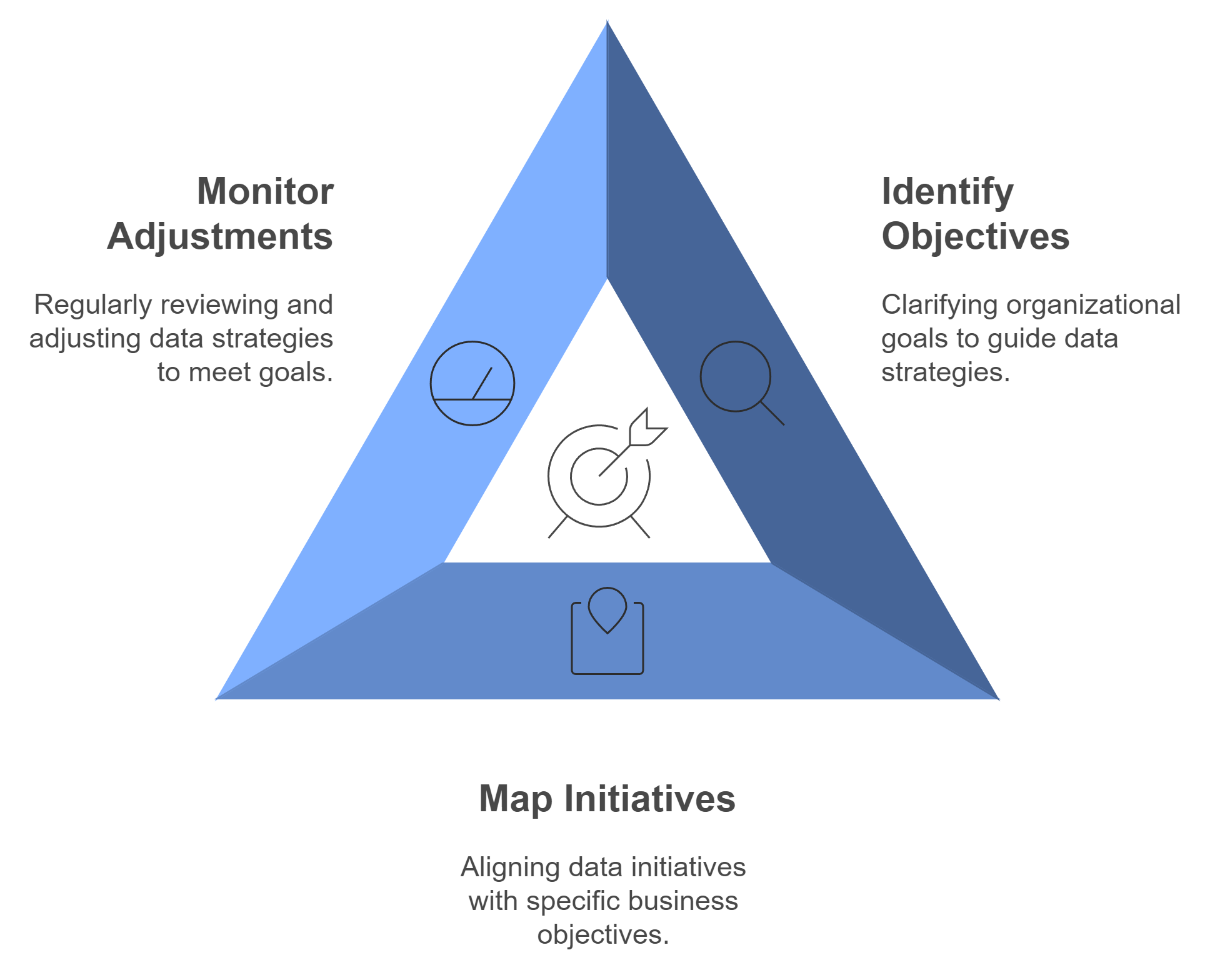
Identify business objectives: Clarify what your organization aims to achieve.
Map data initiatives: Align data initiatives to specific objectives.
Monitor and adjust: Regularly review data outcomes against business goals.
Data isn't a one-time effort; it's a continual process of alignment and improvement. You need to keep adjusting your strategies as business goals evolve. Remember,
"you can’t have a strategy without data, and you can’t have data without a strategy.” - Trist J. Burns
This insight stresses that strategic discussions in data leadership are vital.
Engaging Data Teams
Lastly, it’s crucial to encourage your data teams to engage in the strategic conversation. Data leaders should not just view their teams as technical support. Instead, they should be integral partners in business strategy. When data teams are included in strategic discussions, they can provide insights that reshape business strategies and positively impact organizational outcomes.
Consider this: when data teams are proactive rather than reactive, they can identify opportunities and challenges that bolster business success. Establishing strong communication channels between data teams and other departments fosters collaboration. Thus, the data team becomes champions of data-driven decision-making.
Real World Outcomes
The outcomes here are not just theoretical. Organizations that are conscious of their data strategies report 54% better outcomes. That’s not a small number! This statistic reinforces how critical it is to have a robust, aligned data strategy.
As you implement these strategies, remember that the goal is to ensure your data work is aligned with your organizational objectives. This is how you achieve optimized outcomes. Data initiatives tied to clear business goals stimulate better decision-making and generate real value for your organization. Use this model to foster a culture that embraces data as a central element of strategic planning.
Charting the Course
To visualize the impact of aligning data strategy with business objectives, consider the following chart:
Alignment | Impact |
|---|---|
Directly Aligns with Business Strategy | 80% Success Rate |
Aware of Data Strategy | 54% Better Outcomes |
Ultimately, effectively aligning data initiatives with your business strategy is not just a strategy; it's a mindset. By ensuring that every data-driven effort ties closely with broader organizational goals, you are setting your organization up for inevitable success.
Reversing the Service Desk Mentality
In the realm of data leadership, the *service desk mentality* can be a major hurdle. It often confines data teams to the role of mere support. But this can change. The first step? Identify and address the limitations of the traditional service desk model within your data teams.
The Limitations of the Service Desk Model
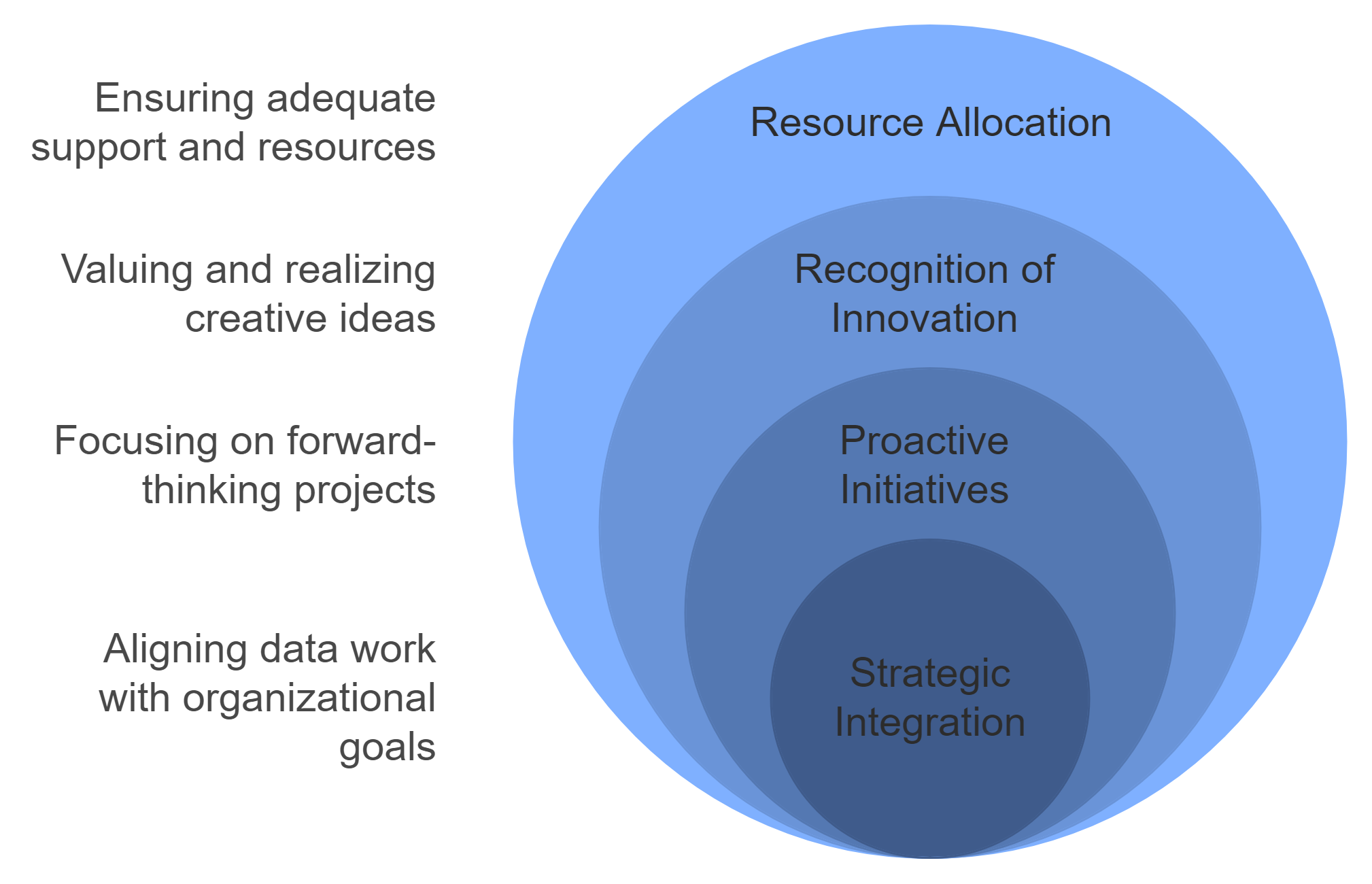
Many organizations still view their data teams as just a resource for technical fixes. This view is not only limiting; it can also be damaging. When data teams are perceived purely as support units, their strategic value goes unnoticed.
Under-resourced teams: A service desk mentality leads to data teams being stretched thin, unable to focus on proactive initiatives.
Lack of recognition: When only reactive support is valued, the innovative ideas of data teams may never be realized.
Exclusion from strategic conversations: Without being part of key discussions, data teams miss opportunities to align their work with organizational goals.
Ask yourself: Is this how you see your data team? If yes, it’s time for a shift.
Encouraging Collaboration and Understanding
Transforming the *service desk mentality* starts with fostering collaboration. Encouraging understanding between data teams and business units is crucial. Both sides need to communicate more effectively. Start by asking questions like:
What challenges do business units face?
How can data provide solutions to these challenges?
By creating open channels of communication, you pave the way for a more productive partnership. Remember, data teams can provide significant insights when they are aware of what keeps business leaders up at night. As Trist J. Burns wisely stated,
"Understanding what keeps business leaders up at night is crucial for data teams to provide real value."
Building Relationships
Use these discussions to build relationships. When business leaders feel that their insights and pain points are considered, they are more likely to engage with and value the data team's work. This connection is vital for securing a seat at the table for strategic discussions.
Adopting an Effective Intake Process
Another crucial step in reversing the service desk mentality is adopting an intake process that focuses on understanding business challenges. Instead of just reacting to requests, your team can take a proactive stance. Here’s how to initiate this change:
Conduct regular meetings with business units to discuss their priorities.
Develop a standardized process for submitting data requests that includes the rationale behind each request.
Implement feedback loops where your data teams can share outcomes of their work with the requesting units.
This structured approach can aid in aligning data initiatives with the overarching business goals. And it's not just theory. Companies that have embraced this philosophy report a remarkable 25% increase in stakeholder satisfaction. Data teams that actively engage align their objectives with business needs and report a 30% increase in effectiveness.
Creating a Culture Shift
Ultimately, it’s about creating a cultural shift in how data teams are viewed within the organization. Data teams need to be seen as essential strategic partners, not just support. When this happens, the results can be transformative, enhancing not just the effectiveness of your data teams but also contributing to the overall success of the organization.
As you explore how to reverse this mentality, remember: the more you shift toward collaboration, the more value your data team can provide.
In the world of data leadership, changing perceptions isn't merely about tasks or deadlines; it's about fostering a mindset of partnership. So, can your data team take on a more strategic role? The answer lies in your willingness to engage and collaborate, making data an integral part of decision-making.
The Future of Data Leadership
The future of data leadership is an exciting and challenging landscape. Now more than ever, the world is witnessing the rapid rise of AI and machine learning. As these technologies evolve, ethical data practices are becoming crucial. Why? Because organizations must prioritize how they collect, manage, and use data. Let’s explore how data leaders can navigate this shifting terrain.
The Growing Importance of Ethical Data Practices
In the age of AI, ethical data practices are not just buzzwords; they are necessities. As data leaders, you need to embrace these practices to build trust with your customers. Consider this: 73% of data leaders believe AI will be a key driver for future growth. With such high stakes, you can’t afford to ignore data ethics.
So, what does ethical data practice involve? It’s about making decisions that are good for both your business and society. For instance, if your organization is transparent about how it uses data, it is likely to gain customer trust. This leads to stronger relationships and, ultimately, a better competitive advantage.
The Role of Data Leaders in Shaping Organizational Culture
You, as a data leader, play a critical role in shaping your organization’s culture. The way you lead influences how data is perceived within your business. Are you treating data as just a technical discipline? Or are you positioning it as a strategic asset?
Trist J. Burns emphasized that
"Data governance will be a critical success factor as we embrace AI capabilities."
This reflection points out that your organization must integrate data governance into its core strategy. This isn’t just an IT issue; it’s everyone’s responsibility! You must ensure that your teams are aligned with organizational goals and understand the value of data-driven decision-making.
Building a Data-Driven Culture
Encourage your teams to be proactive. Help them see that data isn’t just for reporting; it’s for informed decision-making.
Foster collaboration between data teams and other departments. Business teams need to value data and understand its strategic implications.
Continuous Improvement and Adaptation
Being a data leader means you're always on your toes. Continuous improvement isn't just a checkbox; it's a mindset. As tech advancements emerge, you must be proactive in adapting to them. Ask yourself: Are my strategies keeping pace with the rapid changes in technology?
Staying ahead means consistently evolving your data strategies. Consider implementing Objectives and Key Results (OKRs) to keep your teams aligned with organizational goals. Your team needs more than just targets; they need a clear understanding of how their work contributes to the bigger picture.
Addressing Emerging Technologies
Whether it's AI, machine learning, or another emerging tech, prioritize flexibility in your strategies. You should ask: How can we leverage these technologies ethically and effectively? Continuous learning and adaptation are key components in this journey.
Summary
The landscape for data leadership is evolving at a rapid pace. As a data leader, not only must you stay informed about trends, but you also need to navigate the ethical implications these trends bring. With 73% of data leaders viewing AI as essential for future growth, you can't afford to lag behind. Instead, take charge!
Embrace the challenges ahead, focus on ethical data practices, and cultivate a culture that adapts and thrives amidst technological advancements. Your role isn’t merely about managing data; it’s about leading your organization toward a data-centric future.
Conclusion: Embracing Data as a Business Discipline
Data leadership is more than just a buzzword. It’s an essential component of modern organizations. Throughout the livestream featuring Tristan Burns and hosted by Mirko Peters, we explored the significance of effective data leadership in fostering a culture that values information. The insights offered shed light on how data leaders can drive organizational change through strategic applications of data.
One of the biggest takeaways from the session was the pivotal role of data leadership. In today’s dynamic business landscape, data is not just a technical aspect; it is the foundation upon which informed decisions are made. You might wonder—what does this mean for your organization? It means recognizing that data is intimately woven into every facet of business—from sales strategies to financial forecasts. By acknowledging this fact, you stand to transform how your organization perceives and utilizes data.
Tristan emphasized the distinction between individual contributors and people managers in data leadership. Both roles are crucial. However, it’s the leaders who set the strategic vision and manage team development that ultimately pave the way for growth. Your ability to encourage collaboration with stakeholders and maintain high data quality is vital for success. Are you ready to take on this challenge?
Adopting Strategies for a Data-Centric Culture
As the discussion advanced, there was a strong encouragement for each of you to adopt the strategies discussed. It’s one thing to understand the concepts, but quite another to implement them. How can you effectively advocate for a data-centric culture in your organization? Start by raising awareness of how data contributes to achieving strategic business goals. You may also consider pursuing a certification linked to the insights shared in the livestream—this can act as a catalyst for change in your professional trajectory.
Let’s not forget the importance of tackling challenges. Many data leaders face under-resourced teams or find themselves excluded from crucial conversations. To combat this, it's imperative to shift the narrative around data. Rather than viewing data teams as mere service desks, they should be seen as integral partners in business strategy. Improve collaboration and maintain proactive relationships with other departments to showcase how your data initiatives can drive results.
Personal Reflections on Effective Data Leadership
Reflecting on my journey in data leadership, I found that success is ultimately tied to how effectively you integrate data work with your organization’s objectives. Implementing frameworks like Objectives and Key Results (OKRs) can help maintain alignment. When everyone is grouped toward collective goals, the organization can thrive. It’s fascinating to see how a commitment to data governance can enhance a culture of data-driven decision-making. Are you up for the task?
Throughout the session, Tristan’s insights were not just theoretical; they were actionable. You are encouraged to use the resources available, such as the playbook for creating data-centric cultures, because success starts with you. Are you willing to take small steps towards transforming your attitude towards data?
“Data means strategy.” - Tristan Burns
In summary, embracing data as a business discipline is no longer optional; it's essential. As you reflect on the information shared, consider your role in this transformative journey. Advocate for your team, foster collaboration, and view data as a strategic asset, not merely a cost center. The path to effective data leadership is filled with challenges, but the benefits of cultivating a data-centric culture are well worth the effort. Together, let’s inspire a commitment to change—because the future of business lies in how we harness the power of data.
